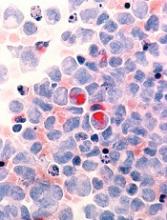A signaling protein may be a “potent” therapeutic target for acute myeloid leukemia (AML), according to a paper published in the Journal of Experimental Medicine.
The protein, interleukin-1 receptor accessory protein (IL1RAP), is often highly expressed on the surface of leukemic stem cells (LSCs) but largely absent from normal hematopoietic stem cells.
Despite this, it wasn’t known whether LSCs require IL1RAP to survive and proliferate and whether inhibiting IL1RAP could be a successful way to treat AML.
Ulrich Steidl, MD, PhD, of Albert Einstein College of Medicine in Bronx, New York, and his colleagues conducted research to find out.
The team found that targeting IL1RAP via RNA interference, genetic deletion, or antibodies induced the death of AML cells, including LSCs, in vitro. These effects were seen in the absence of immune effector cells, indicating that AML cells intrinsically depend on IL1RAP.
In contrast, antibodies targeting IL1RAP had no effect on the growth and survival of normal hematopoietic cells.
In mice, IL1RAP antibody treatment inhibited the proliferation of AML cells without causing any negative side effects.
The researchers also found that IL1RAP’s role in AML is not restricted to the IL-1 receptor pathway.
The team found that IL1RAP enhances the activity of 2 other membrane receptor proteins, FLT3 and c-KIT, which are known to stimulate the proliferation of LSCs when activated by their ligands. IL1RAP antibodies inhibited the ability of these ligands to induce proliferation in AML cells.
“Our findings show that IL1RAP can amplify multiple key pathways in AML, demonstrating a much broader role for this protein in disease pathogenesis than previously appreciated,” Dr Steidl noted.
“Importantly, as IL1RAP is also overexpressed in the stem cells of chronic myeloid leukemia and high-risk myelodysplastic syndromes, there is significant therapeutic potential in further developing IL1RAP-directed targeting strategies.”


